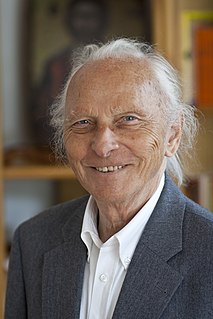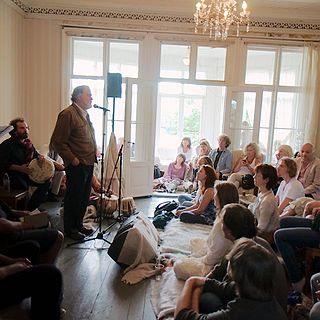A Quote by Tony Campolo
I don't know what to make of the Muslim mystics, especially those who have come to be known as the Sufis. What do they experience in their mystic experiences? Could they have encountered the same God we do in our Christian mysticism?
Related Quotes
Loneliness is the fundamental force that urgees mystics to a deeper union with God... An experience of God quenches this thirst for the absolute but at the same time, paradoxiacally, whets it, because this is an experience that can never be total; by necessity, the knowledge of God is always partial. So loneliness opens up mystics to a desire to love each other and every human being as God loves them.
There is a possibility in human minds of something mysterious as the night-wind, deep as the sea, calm as the stars, and strong as Death, a mystic contemplation, the “intellectual love of God.” Those who have known it cannot believe in wars any longer, or in any kind of hot struggle. If I could give to others what has come to me in this way, I could make them too feel the futility of fighting. But I do not know how to communicate it: when I speak, they stare, applaud, or smile, but do not understand.
A mystic doesn’t say “I believe.” They say “I know.” A true mystic will ironically speak with that self-confidence but at the same time with a kind of humility. So when you see that combination of calm self-confidence, certitude, and humility all at the same time you have the basis for mysticism in general.
I think what happens in a religious life is that we have those experiences of affirmation and that one starts to live a Christian life or a Jewish life or a Muslim life or a Buddhist life, by affirming that affirmation each day. Each day you say 'Yes' to that Yes. So the life of being a Christian for example, is always a life of double affirmation, that you each day say 'Yes' to those counter-experiences of saying 'Yes', even when you're not experiencing them at that time, you're remaining loyal to that experience.
In mysticism that love of truth which we saw as the beginning of all philosophy leaves the merely intellectual sphere, and takes on the assured aspect of a personal passion. Where the philosopher guesses and argues, the mystic lives and looks; and speaks, consequently, the disconcerting language of first-hand experience, not the neat dialectic of the schools. Hence whilst the Absolute of the metaphysicians remains a diagram —impersonal and unattainable—the Absolute of the mystics is lovable, attainable, alive.
Flying while Muslim is nerve-racking in itself. Every time I prepare to fly, I have to make sure the anxiety I feel from all the stares I get from the moment I walk into the airport doesn't show on my face. This is what every woman in a hijab or bearded Muslim man experiences. But we are not alone: Sikh men who wear a turban experience the same anxiety because they encounter Islamophobia by dint of being perceived as Muslim.
Mysticism, according to its historical and psychological definitions, is the direct intuition or experience of God; and a mystic is a person who has, to a greater or less degree, such a direct experience -- one whose religion and life are centered, not merely on an accepted belief or practice, but on that which the person regards as first hand personal knowledge.
In the dominant Western religious system, the love of God is essentially the same as the belief in God, in God’s existence, God’s justice, God’s love. The love of God is essentially a thought experience. In the Eastern religions and in mysticism, the love of God is an intense feeling experience of oneness, inseparably linked with the expression of this love in every act of living.
In western civilization, the period ruled by mysticism is known as the 'Dark Ages' and the 'Middle Ages'. I will assume that you know the nature of that period and the state of human existence in those ages. The Renaissance broke the rules of the mystics. "Renaissance" means the "rebirth". Few people today will care to remind you that it was a rebirth of reason - of man's mind.
I believe in Islam. I am a Muslim and there is nothing wrong with being a Muslim, nothing wrong with the religion of Islam. It just teaches us to believe in Allah as the God. Those of you who are Christian probably believe in the same God, because I think you believe in the God Who created the universe. That's the One we believe in, the One Who created universe - the only difference being you call Him God and we call Him Allah. The Jews call Him Jehovah. If you could understand Hebrew, you would probably call Him Jehovah too. If you could understand Arabic, you would probably call Him Allah.
This human need for mysticism – surrender to an unknown truth, union – stands at the helm of all romantic feeling. It is, in essence, the same intimacy known in a mother’s arms; in those who are deprived of the experience, the need freezes and, distorted, it can rent a life. All addiction has as its foundation skewed yearning for the same transcendence. For me, the spell of the material was broken by my brother’s death; after his suicide, all I wanted was the renewal of my connection to the intangible.





































